
Between April and August of this year, 270 museums professionals, scholars, and students joined The Incluseum and participated in the #MassActionReadingGroup.
What is MASS Action?
MASS Action—Museum as Site for Social Action—is a collaborative project that launched in 2016, centering on the question: How do you transform museums from the inside out? Through a series of public convenings and the creation of a toolkit of resources, the project’s intention is to share strategies and frameworks needed to align museums with more equitable and inclusive practices.
Moreover, in the words of Elisabeth Callihan, MASS Action project co-founder and project manager:
MASS Action is not a project anymore. It is a network of people, individuals committed to seeing the museum field change, connecting in solidarity, recognizing there is strength in numbers. That, like fractals, if we all individually commit to do our part on a small scale, we will start to see change on a large scale. That with enough voices, we can make change.
At its 2017 convening, MASS Action gathered museum practitioners from thirty organizations, and in 2018 from sixty-four. These participating museums were committed to embedding strategies of inclusion into their institutions. The Minneapolis Institute of Art acted as the convener and platform for this project, yet the work that resulted from this project belongs to the collective of participating museum practitioners and stakeholders that help to create and embody it.
You can learn more about MASS Action on its website.
Why do a virtual reading group?
The MASS Action Toolkit is made up of eight chapters, seven worksheets, and a list of key terms and resources, for a total of 232 pages. While the material is rich, the length of the toolkit can be a bit daunting for those wishing to engage with it, which is where the idea for a virtual reading group came about. Rose Paquet Kinsley, cofounder of the Incluseum, wanted to read through the toolkit and thought that a structure and a community of learning would help guide and motivate the process.
The #MassActionReadingGroup was a group of over 270 museum enthusiasts, professionals, students, and/or activists who came together to read and discuss the MASS Action Toolkit chapter-by-chapter over the course of sixteen weeks. This group represents a broad swath of museum types, professional positions, U.S. regions, and even countries. Every other Monday, The Incluseum blog published a chapter and worksheet from the MASS Action Toolkit, and participants took part in an hour-long Twitter chat on the previous week’s assigned chapter.
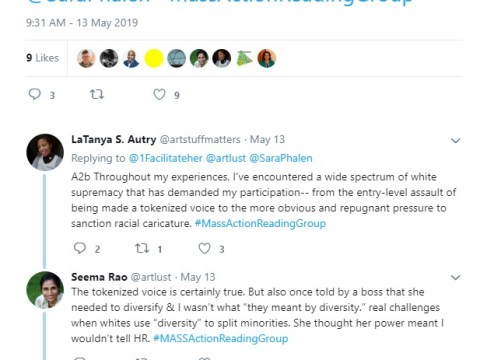
This dynamic structure allowed participants to collaboratively and interactively work their way through the toolkit. For example, on May 13, we discussed Chapter 2: Moving Toward Internal Transformation. This chapter focuses on awareness, acceptance, and action as vital phases for internal organizational development in cultural and arts institutions. Chat participants interacted directly with two of the co-authors of the chapter to examine how they can apply this learning to their professional experiences.
Many have joined as part of an institutional group, reading as a team and meeting face-to-face to build professional capacity.
How can I get involved?
While the reading group has run its course, you can catch up on the chapters and conversations here:
- Chapter 1 and Worksheet 1
- Chapter 2 and Worksheet 2
- Chapter 3 and Worksheet 3
- Chapter 4 and Worksheet 4
- Chapter 5 and Worksheet 5
- Chapter 6 and Worksheet 6
- Chapter 7 and Worksheet 7
- Chapter 8 and Worksheet 8
Using the above, you can organize a reading group at your institution or even regionally.
About the authors:
Rose Paquet is the co-founder of The Incluseum, a platform that has been collaboratively inquiring about inclusion in museums for the last 7 years. In addition to co-facilitating this platform, she is a PhD candidate at the University of Washington’s Information School.
Janeen Bryant is an intersectional educator, facilitator, trainer, and agitator. She launched a consultancy, Facilitate Movement, and is known widely as a community-centered program developer both regionally and nationally. Her writing can be seen in industry-specific publications such as the MASS Action (Museum as Site for Social Action) Toolkit and the Center for the Future of Museums blog.
Skip over related stories to continue reading article

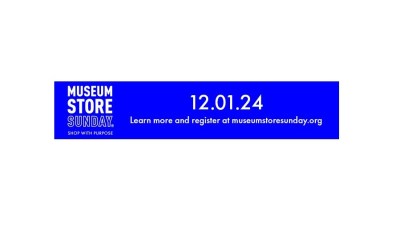
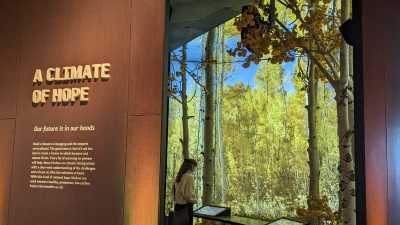
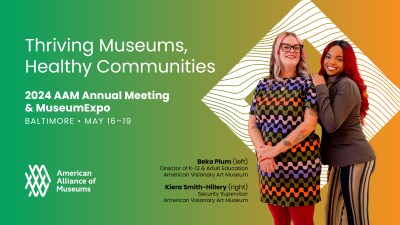

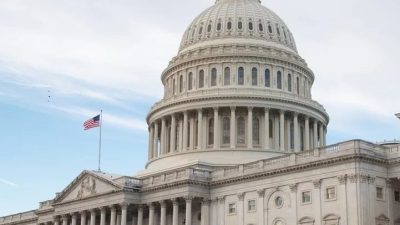
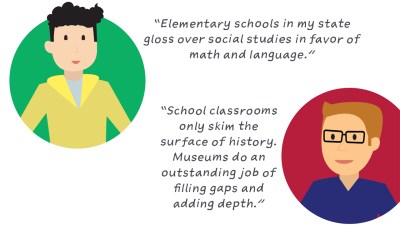
Comments